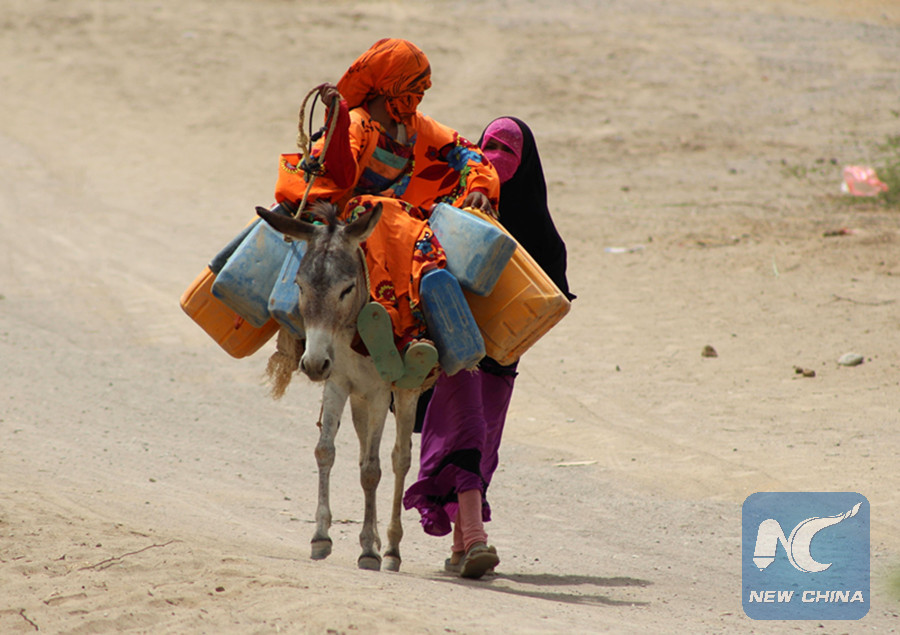
Yemeni children displaced from the Red Sea port city of Hodeida walk with a donkey to fill up their jerry-cans with water, at a camp for the displaced in nearby Khokha under control by forces loyal to the Saudi-backed Yemeni government, on June 22, 2018. (AFP photo)
SANAA, June 24 (Xinhua) -- Thousands of families arrived on Saturday in the rebel-held capital Sanaa, after fleeing military confrontations between pro-government forces and armed rebels in Yemen's Hodeidah port city.
The displaced families were received by local authorities in Abu Bakr al-Sideek school, an empty school along the Hodeidah-Sanaa road in the western part of Sanaa.
Wearing in traditional black abaya and niqab, hundreds of women stand in a long line at the state-owned school to register as internally displaced people (IDPs) to receive aid and allowed along with their husbands and children into the classrooms.
Some families fled their homes in the village of al-Manzar and al-Durayhemi district, about 10 km south of Hodeidah airport, while some escaped from the center of Hodeidah city for fears of an immediate military attack.
It took three hours until authorities permitted journalists to enter the school and interview the families.
Families who arrived earlier this week, have already given classrooms, while dozens of registered families sit on the dirt in the school's courtyard awaiting for the authorities to accommodate them.
An official told Xinhua on condition of anonymity that the displaced families should first register their names and the places they escape from. Then they would be distributed in the school or other schools in the capital.
"No exact number of the Hodeidah IDPs has been yet available, as many families are still arriving," he said.
Anwar Mohammed Abkar, his wife and their four children managed to flee from al-Manzar village three days ago. It took them two days of walking into Hodeidah city, where they stayed for one day, and on Saturday they arrived in Sanaa.
"First, we moved to an urban area in the eastern edge of Hodeidah city, where we stayed for one day and the authorities there (rebels) told us we should leave because the Saudi-led coalition could wage airstrikes on this area or possibly launch a ground attack," Abkar said.
Abkar has already registered his family in the school and is sitting on the ground at the campus waiting to be accommodated to an empty classroom.
"I have spent all my money on the travel, and now I wait for the authorities here and humanitarian aid agencies to give us food and water," he said.
Fatima, a 25-year-old mother of four children, said one of her children is infected with scabies. They arrived at the school two days ago, escaping from Assalah area east of Hodeidah airport.
"No good food, no any medicine, no cleaning tools, no clean bathrooms, no soap and no electricity here in this school," Fatima said.
"They (authorities) just gave us promise that they will meet our needs, but nothing happen. They did not even give me a blanket or mattress for me and my children to sleep on it. We have been sleeping on the bare ground since I arrived," she said.
Abdullah Hassn Mahdi escaped from Hanak area south of Hodeidah airport along with his wife and three children, and arrived Saturday in Sanaa and is awaiting to be accommodated in a classroom.
"My wife is sick with cancer, and we are very tired. We lost everything. I hope war end soon, so we can go back home," Mahdi said.
"All night, all day, sounds of fighter jets, airstrikes and heavy machine guns terrified us and forced us to flee home," he said.
On June 13, pro-government Yemeni forces supported by the Saudi-led coalition seized control of Hodeidah airport in a major battle that killed dozens from both forces.
The Saudi-led coalition intervened in Yemen's civil war in March 2015. The war has so far killed over 10,000 people, mostly civilians, and forced three million others out of their homes.
Hodeidah is the lifeline route for importing and transporting humanitarian aid to northern Yemen, which is under rebel Houthi control.
The coalition has urged the rebels to withdraw from the port city to avoid military confrontations and humanitarian catastrophe, otherwise the coalition threatened to storm it.
The displaced families said the clashes are moving nearer the center of the city, recalling tragic situations suffered by the residents.
On Wednesday, Chief of the Houthi rebels, Abdulmalik al-Houthi said in a speech aired by his group al-Masira television that he had proposed to UN special envoy Martin Griffiths to place Hodeidah under UN supervision.
"We welcomed a supervisory, technical and logistical role of the UN on the port of Hodeidah, but they are liars. They just made baseless justifications," al-Houthi said in a speech commenting on the Saudi-led coalition forces' control of the Hodeidah airport a day earlier.
Griffiths on Friday said in a statement that he is optimistic to establish a new political process between the Yemeni rival parties, saying he would launch a first round of the Yemeni peace talks next month.
Al-Houthi vowed to resist the coalition forces, calling on his followers for a mass mobilization to recapture Hodeidah airport.

